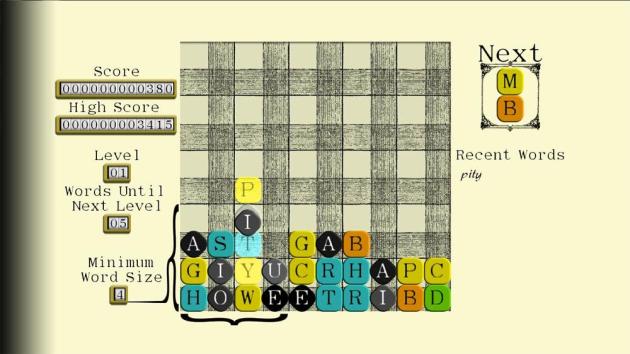Scribendus
January 22, 2013 1 Comment
Did you know that when they tested the first atomic bomb, those involved took bets on what they thought might happen? Mostly it was about the amount of kilotons the explosion would be, but there were also side bets such as whether or not it would kill all present, cause the fault line to collapse, knock the Earth off its axis, or blow up the entire planet. I’m not sure how the winner would have collected if the last option had won out, but it’s true and well documented, and only some of those bets were tongue-in-cheek. Smart guys who, truth be told, had no fucking clue what would happen. With some experiments, you can’t know until you push the button.
Scribendus attempts to combine Scrabble and Tetris. I’m sure this has been attempted before (someone steered me in the direction of a Tetris-craze era title called Wordtris) but I’ve never played one. It’s a concept that seems like it should work, but in this case, it doesn’t. The idea is two letters at a time drop from the ceiling and you have to stack them in a way that forms a word. You can build a word (minimum four letters) diagonally, horizontally, or vertically. The problem of course, is being given two random letters at a time doesn’t leave you a whole lot of room for strategy or versatility. I consider myself pretty dang good at word games, but I couldn’t make Scribendus work for me. The only strategy that seemed to work was trying to build one decent sized (six letter or so) word across the bottom and stacking all other blocks on the side, but even this didn’t work. I got my best score by completely ignoring the letters all together and just stacking the blocks randomly, spacing the vowels apart from each other. Using this technique, I scored big points and multiple combos. And I don’t even know what words I made.
I can’t really slam Scribendus too much. It looks good, sounds good, and controls good. It feels to me like a worthy experiment that failed. That will happen in the land of indies. While my enthusiastic fans might want to me to shred every game that isn’t good, now might be a good time to remind readers that it’s okay to try something new and not have it succeed. Sometimes you can’t know if something will work until you create it and market it. Look at Lexiv, the Scrabble-meets-Sim City game. That could have just as well been a disaster too. I admire creator Dave Turka for giving it a try. His particular Manhattan Project simply failed to detonate, and now he become derp, destroyer of words.
 Scribendus was developed by Pygmalion’s Box
Scribendus was developed by Pygmalion’s Box
80 Microsoft Points noted that a man named Isidor Isaac Rabi won the Trinity test betting pool with a guess of 18 kilotons (actual explosion was 18.6 kilotons) in the making of this review. His opponents overbid, allowing him to take both showcases.


I really like that story in the beginning. It makes me wonder where we would be if we allowed ourselves to take such financial risks with entertainment. When millions of dollars are put into a video game, they go with a safe bet, because they care more about a return on investment than furthering the medium. Sure, it’s not as important as, say, killing people with a bomb, but it would be nice to see such investment and risk in the industry.